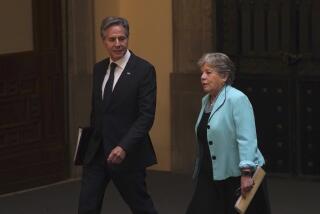Plan to Combat Drug Trafficking
- Share via
Re “A New Attack on Drugs,” editorial, Feb. 20: A multilateral approach to reducing drug trafficking and abuse holds tremendous promise. It is important to note, however, that in the short term we do not expect the certification law (which requires the president to certify that individual nations have made progress in meeting the goals of the 1988 U.N. convention on drugs) to be changed.
Recent joint evaluations by our international partners have been quite useful. For example, under the Financial Action Task Force system, each participating country conducts an annual self-assess- ment and undergoes a detailed multinational evaluation. This approach, designed to combat money laundering, works because it uses objective standards and relies on technical experts from partner countries. A similar system must be developed to combat wider issues of drugs and drug abuse.
At the Summit of Americas in Santiago, Chile, in April, President Clinton will ask all the leaders in the hemisphere to join the U.S. in a coalition against drugs (no formal treaty, as implied in your editorial, is yet planned). This partnership, to be managed through the Organization of American States, would include a multinational evaluation process. Such an alliance will be an important step toward a unified approach to our common hemispheric drug problem.
BARRY R. McCAFFREY, Dir.
National Drug Control Policy
Washington


